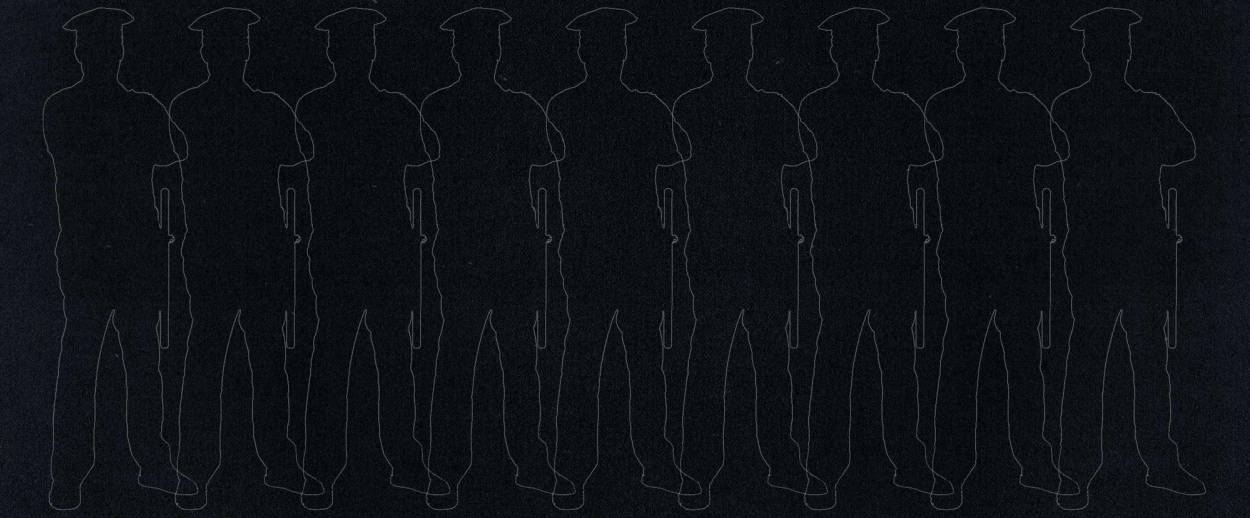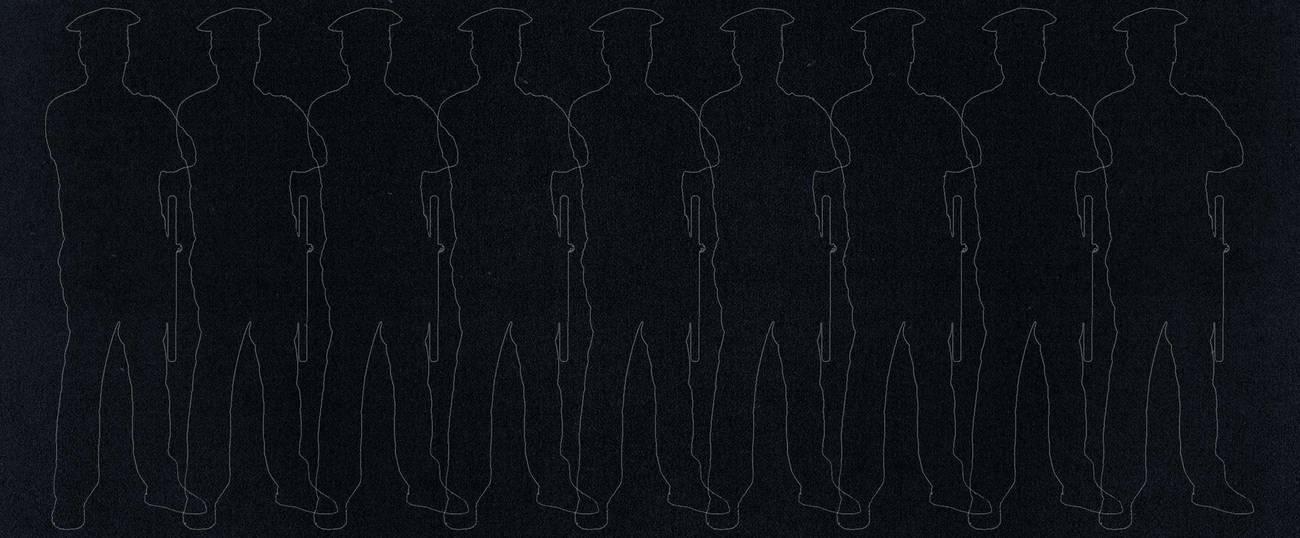Cops Don’t Make All Jews Feel Safer
Our synagogues need a police presence that makes all of us feel safe—including those who are terrified of police




When you become a parent, you become intimately acquainted with fear. Fear walks hand and hand with you and your child to the playground, to get a flu shot, across the street and to the car while you fasten the car seat. Fear is a constant companion. My family struggles with all of the typical fears—how high should we let our daughter climb on the jungle gym? But beyond those fears, for us, lie the tensions and concerns inherent in our identity as a mixed-race Jewish family. For example: How do we keep our daughter safe in a country where hate crimes are rising? How do we ensure that those who are sworn to protect her will not be the ones to cause her harm? And then there’s this especially painful fear: How do I keep her safe in synagogue, the place where I once felt the safest and the most loved?
As the mom of a young black girl I have plenty of cause for fear. A Georgetown study released in 2017 found that black girls as young as 5 are perceived as being more adult and less innocent than white girls the same age, and therefore less in need of protection and support as opposed to punishment. Another study found that police were more likely to get violent with black children than white adults. A report from the African American Policy Forum found that black girls were likely to be punished more harshly by both the education system and the juvenile justice system. High profile cases of police becoming violent with young black girls at school and in public coupled with the #SayHerName movement are enough to make me wonder if my kid is safer without police at synagogue. I struggle to have the conversation about keeping all of our kids safe, while also addressing the specific vulnerability of young black girls like my daughter.
As the wife of black man, I fear that in an emergency my husband could be mistaken for the perpetrator of violence rather than a victim. Since the Tree of Life shooting, two innocent black men, Jemel Roberson and Emantic Bradford Jr., have been killed by police who mistook them for a shooter. I respect police officers—especially those who work to keep Jewish communal spaces safe. I know they risk their lives every day. But I am also terrified of them. I have watched them profile and harass the love of my life. I have had police officers demand my husband produce a deed to prove he lived in our own home and pull us over to ensure my husband was not a danger to me. Police have taught me to fear them, and I fear for my family when they are near me. But our synagogues and other communal spaces also need them, and Jews have reason to be grateful for them.
*
My fears, as a parent, a wife, and as a Jew, have grown since the Tree of Life shooting. I decided to begin reaching out to experts who might help synagogues grapple with these two seemingly competing needs that both have white supremacy at the root. I had questions. What were the options for communities that faced both fear of biased police and fear of terrorism? How could we keep our communities safe and what were our options for security, both with and without law enforcement? What productive conversations could be had with police officers, to ensure that, if they were in synagogue spaces, they wouldn’t assume people of color didn’t belong? Can these fears lead us to empowering discussions, or will they rip us apart?
I began with David Friedman, vice president of law enforcement and security at the ADL. “It’s important and legitimate to be having conversations about bias with police,” Friedman told me. “We want that outside of Jewish institutions. We want police officers to be aware of their biases across the board.” He suggested that communities “create a forum in which police can meet members of the synagogue. This can be a mutual education experience. We have to be direct and explicit about our needs, but we must create opportunities for quality and quantity of contact so they can understand what a synagogue is like and who populates it.” He was sympathetic to my fear that a police officer might mistake my husband or child as a threat. “Law enforcement may have a narrow idea of what a Jew looks like. The more contact and understanding they have the better. You can be explicit about that: ‘You should be aware that not everyone in this synagogue looks the way you may think Jews look. We have people of color, women and transgender people.’ That’s the kind of information, like the layout of the synagogue, that they need, just as much as the floor plan.”
And Friedman stressed that if daily, constant presence of armed police officers made some congregants uncomfortable, that wouldn’t necessarily hinder the security of the entire community. “Having police, having armed security is only one component to having a strong security system,” he said. “It is not a full solution, even when it is available. Every synagogue needs a plan that they practice and train people to execute that includes rabbis and lay leaders. The security system isn’t [just] law enforcement—it’s technology, hardware, and the practices, policies, and procedures developed with the institution that are implemented on a regular basis. That’s where the security lives.”
I turned next to Brian Levin, director of the Center for the Study of Hate and Extremism at California State University, San Bernardino. He stressed the importance of understanding and assessing white nationalist threats. “Hate crimes are up in general, hate crimes against Jews are up,” Levin said. “When you have multiple mass casualty events with neo-Nazis, every Jewish institution and every house of worship should undertake a threat assessment.” For example, “The police department should have a blueprint of your house of worship and every house of worship in town.” But he added that a synagogue “can have a threat assessment without it being done by police.”
Levin was concerned about the state of extremism. “We have seen the rise of white nationalism. We have seen the mainstreaming of white nationalism. We have a coalesced racial nationalism that is taking place in the United States amidst significant political polarization, dissemination of conspiracy theories and political instability. These are all historic markers of increased anti-Semitism.” That said, he was quick to point out that most Americans have a favorable opinion of Jews, and a majority are concerned about rising anti-Semitism. “Let’s not scare people,” he cautioned.
Still, Friedman stressed the need for relationships with local police. “There needs to be a familiarity between the community and a relationship with specific members of law enforcement they can reach out to in an emergency,” he said. “Most of the problems faced will not be active shooters, so ongoing relationships with law enforcement are critical. If there are a series of messages or bomb threats, law enforcement is essential to evaluating the severity of the threat. This is when people need to turn to professionals—you can’t make these determinations as an amateur.”
Talking to Friedman and Levin left me feeling empowered. There was room, it seemed, for synagogue communities to create security mechanisms that were inclusive, empowering, and created a comfortable and safe daily environment. The question then became, how can synagogues have those conversations in ways that strengthened community instead of letting fear tear communities apart? For answers, I turned to my friend Tema Smith, director of community engagement at Holy Blossom Synagogue in Toronto. I wanted her insight, both professionally and as a Jew of color, on how synagogues could have inclusive conversations on security.
“In an ideal world, any decisions about security would be made using an inclusion lens that considers not only who is in your building today, but who might be in it in the future,” Smith said. “This means not only considering congregants, themselves representing a racially diverse Jewish community, but also staff, suppliers, and others who come in and out of synagogue spaces regularly.” She noted that the Jewish community is “dealing with anxieties that feel in conflict with each other, and we need to be able to create the space to hold them and support each other. This moment can provide a great bridge to have difficult discussions about what it means to be part of the communities who are the most targeted in hate crimes across North America.”
*
As we mourn the loss of life in Pittsburgh, we must search for ways to keep the whole community safe. I am a mother and a wife who is terrified of white supremacy and how it could kill my family. I am also a political organizer who has brought communities together for my entire career. I know the community is frightened—I know because I am part of this community. I would never ask anyone to be quiet about their fears, especially not now. I think we must share all of our fears in order to build a safe and secure community. After consulting with experts, I believe we can respond to our fears of violence in an inclusive and holistic way.
First, we must make security decisions community decisions. They must be discussed in open forums, with broad community buy-in. Second, we need to recognize that we are a diverse community with substantive differences, and security can mean different things in different places, as long as we stay both vigilant and inclusive. We must respect the needs of individual communities. Whatever a synagogue decides, I strongly encourage integrating anti-bias and anti-oppression training into your security apparatus and your ongoing community life. It may be hard at first, but it will make your community stronger, closer, and more just. It may also save someone’s life.
I need our Jewish community to understand that families like mine are doubly vulnerable and must be heard in conversations about how to keep Jews safe. We are not competing against the desire to keep children safe. We are terrified—as terrified as you. We just have a different layering of fear. We can find ways within our individual synagogues and institutions to confront our fears proactively and create ways to keep everyone safe. We need to breathe, step back, and listen to each other. While we are all afraid, we cannot let fear dictate our security policies in ways that make our community less safe. Make no mistake: Black Jews are a part of our community and we must keep them safe as well. We cannot let our terror break our communities. I pray that this can be a moment where in seeking to make our communities safer we also make them stronger.
***
Like this article? Sign up for our Daily Digest to get Tablet magazine’s new content in your inbox each morning.
Carly Pildis is the Director of Grassroots Organizing for the Jewish Democratic Council of America, and an advocacy professional based in Washington, D.C. Her Twitter feed is @carlypildis, and her website is www.carlypildis.com.